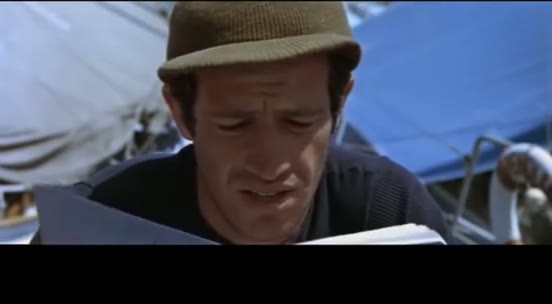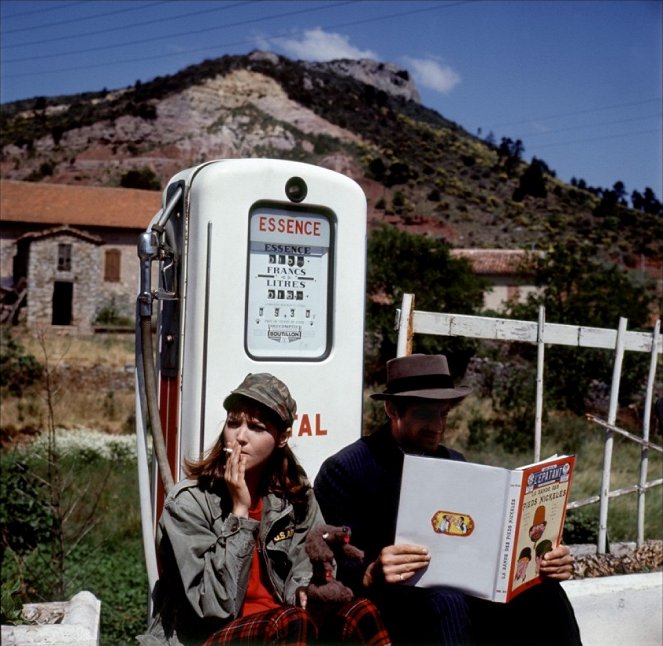Réalisation:
Jean-Luc GodardPhotographie:
Raoul CoutardMusique:
Antoine DuhamelActeurs·trices:
Jean-Paul Belmondo, Anna Karina, Samuel Fuller, Jean-Pierre Léaud, Pascal Aubier, Raymond Devos, Krista Nell, Hans Meyer, Dominique Zardi (plus)VOD (3)
Résumés(1)
Après avoir perdu son emploi à la télévision, Ferdinand Griffon, désabusé, prend conscience du profond ennui dans lequel le plonge sa vie bourgeoise. Un soir, il décide de tout quitter pour la baby-sitter, Marianne. Retranché dans l’appartement de la jeune femme, Ferdinand, à qui Marianne préfère le doux nom de Pierrot, se retrouve bientôt mêlé aux affaires politico-frauduleuses de cette dernière. Ne faisant ni une ni deux, les amants sautent dans une voiture et s’enfuient en direction de la Côte d’Azur, espérant étancher ainsi leur soif d’amour et d’aventure. (LaCinetek)
(plus)Vidéo (4)
Critiques (3)
What is Pierrot le Fou about? I could answer that it's a French variation of Bonnie and Clyde, that it's a story of a couple of desperados on the run from the law, the underworld, and their responsibility. But that wouldn't be true. It's a film about the immense ego of Jean-Luc Godard and his endless playing with the possibilities of cinematic language and with all the tools that a director has at their disposal to influence the final form of a film. I like Godard's debut and gave it 5 stars. A few years later, Godard had such a name that he didn't have to care about anything and he created a self-centered play where actors sing, recite verses, quote philosophers, turn to the audience, discuss their relationship to the Vietnam War, pretend, and don't save whales only because ecology was not yet at the center of attention of the French intellectual elite at that time. Godard interchanges scenes, lets the actors overact, and changes locations according to his current mood. I understand that the result can appeal to certain types of intellectuals, even put them in ecstasy, but Godard's manneristic self-indulgence stopped entertaining me after 3/4 of an hour. For film theorists, students of film studies, and last but not least, a numerous gang of snobs, it is certainly an interesting piece of work, but I am staying grounded. Lynch likes to play with the audience, Godard somehow doesn't need to, and he suffices on his own. I don't regret the time I spent with Pierrot le Fou because the film is part of film literacy, but I gladly return to films based on stories and human characters. Overall impression: 35%.
()
I simply find it difficult to watch these movies. There are great ideas here, excellent thoughts, but as a whole, it's just not something that really entertains or captivates me. Jean-Luc Godard decided to present ideas in B-movies, and there were so many of them that you can't really keep up. Too many things in one place, too many peculiar approaches to storytelling and acting, although Belmondo simply charms.
()
Years after its release, Pierrot le Fou, or rather its protagonist, paradoxically became for some admirers of the French New Wave an adored monument to the pompous ideal of the existentially tormented intellectual. The paradox lies in the fact that Godard ridicules that icon and shows that there is nothing in it that is worth emulating. On the contrary, he brings the self-centredness at its core to the surface. With the same anarchic mockery, he also undermines the formulas of adventure and action movies and romances about lovers on the run (i.e. genres that made Belmondo an international star in his previous and, especially, later films). Pierrot le Fou is a playfully and Dadaistically subversive film with a formulaic beginning and ending, but everything in between is refreshingly random and creative. Every single sequence is an imaginative meta-treatment of a given formula, whether in the form of subverting it, parodying it, reflecting on it, trivialising it or simply omitting it altogether. Pierrot le Fou is actually an essentialist film because here the characters enter a room through a window. Godard literally fulfils the definition of a director as it was formulated nearly four decades later by the Japanese maverick Takashi Miike. According to Miike, the screenwriter writes “the protagonist enters the room”, whereas the director has to come up with how he enters – usually through a door, or perhaps through a window. While the non-conformity of other New Wave filmmakers now comes across as staid and mainstream, Godard never ceases to fascinate and even appeals to new generations. His subversiveness does not remain only on the surface, but cuts to the very core of cinema, thus defying the usual assimilation into the mainstream.
()



Annonces